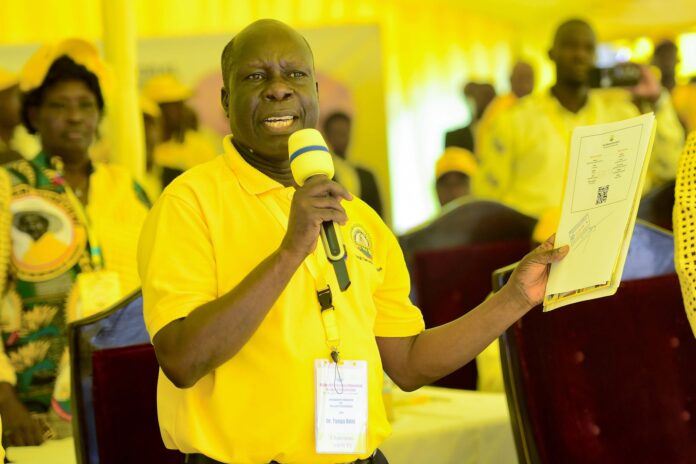As the National Resistance Movement (NRM) prepares for its highly anticipated primary elections tomorrow, July 17, 2026, to select flag bearers for the 2026 general elections, a dark shadow hangs over the process: the party’s well-documented history of electoral violence, vote rigging, and outright theft. The ongoing campaigns have already been marred by incidents of lawlessness, raising critical questions about the NRM’s commitment to democratic principles and the integrity of its internal processes.
Is NRM a Violent Political Party?
While the NRM officially espouses democratic ideals, the pervasive nature of violence and malpractice during its internal elections has led many observers to question whether it has become an inherent characteristic of the party’s political culture. Critics argue that the repeated patterns of intimidation, voter bribery, ballot stuffing, and even physical assaults are not isolated incidents but rather symptoms of a systemic problem.
The high stakes involved in securing the party’s flag, often seen as a direct path to victory in many constituencies due to the NRM’s dominance, fuels aggressive competition. This, combined with perceived impunity for perpetrators and a winner-take-all mentality, creates an environment where candidates and their supporters resort to illicit means to gain an advantage. It’s less about the party’s ideology being violent and more about a political system and internal party discipline that have evidently failed to curb electoral thuggery.
How NRM Electoral Violence Undermines Democracy
The repercussions of such electoral misconduct extend far beyond the party’s internal affairs, deeply eroding the foundations of Uganda’s nascent democracy.
Erosion of Trust: When primaries are marred by violence and fraud, they undermine public trust in the entire electoral system, not just the NRM’s internal processes. Voters become disillusioned, deterred from participating, and lose faith in the legitimacy of their representatives.
Disenfranchisement: Violence and intimidation directly suppress voter turnout. Citizens, fearing for their safety, may choose to stay home, effectively disenfranchising themselves. Candidates who might genuinely represent the people’s will can be intimidated out of the race.
Weakening the Rule of Law: A consistent failure to prosecute electoral offenders fosters a culture of impunity. When those who break electoral laws face no consequences, it sends a message that illegal actions are permissible, further weakening the rule of law in the broader society.
Setting a Dangerous Precedent: The NRM, as the ruling party, sets the tone for the nation’s political landscape. If its internal elections are plagued by violence and malpractice, it normalizes such behaviour, making it harder to condemn or prevent similar incidents in national general elections.
Undermining Internal Party Democracy: A party that cannot conduct fair internal elections risks alienating its own members, stifling internal dissent, and preventing genuine leadership from emerging. This ultimately weakens the party itself and its capacity to serve the nation.
Can NRM Avoid Violence?
For tomorrow’s polls, the NRM faces an immense challenge to break from its past. While the party leadership has often issued stern warnings against malpractices, their effectiveness has been limited by a perceived lack of decisive enforcement. With violence already reported during the campaign period, the prospects of a completely peaceful and fair process appear slim without a drastic, last-minute intervention.
Avoiding violence tomorrow would require an unprecedented level of commitment from the party’s top echelons – including clear, unambiguous directives against any form of electoral crime, swift and visible action against perpetrators, and robust security deployment that is genuinely impartial. However, the deeply entrenched nature of these issues makes immediate, radical change difficult.
How NRM Can Avoid Violence in Its Electoral Process
For the NRM, or any dominant political party, to genuinely purge violence from its electoral processes, a multi-faceted and determined approach is essential:
Genuine Political Will and Leadership: The most crucial factor is an unequivocal commitment from the very top leadership to stamp out violence and malpractice, regardless of who the perpetrators are. This commitment must translate into action, not just rhetoric.
Strict Enforcement and Sanctions: Implement clear, enforceable disciplinary measures for those found engaging in violence, rigging, or intimidation, regardless of their political standing or perceived influence. Impunity must end, and high-profile prosecutions would send a powerful deterrent message.
Transparent and Accountable Processes: Ensure voter registers are clean and publicly accessible, voting materials are secured, and results tabulation and transmission are open to scrutiny by all stakeholders. The internal electoral commission must be perceived as truly independent and impartial.
Impartial Security Forces: Deploy security personnel who are well-trained in crowd control, electoral law, and human rights. Crucially, they must act professionally and impartially, protecting all participants and upholding the law rather than being seen as partisan enforcers.
Effective Internal Dispute Resolution: Establish credible internal mechanisms for candidates to lodge complaints and resolve disputes peacefully before they escalate into violence. These mechanisms must be seen as fair, timely, and binding.
Civic Education and Sensitization: Educate party members, candidates, and the public on the importance of peaceful and fair competition, emphasizing that elections are a contest of ideas, not physical prowess.
De-escalation Strategies: Develop rapid response teams and communication channels to address potential hotspots and de-escalate tensions before they erupt into violence.
Post-Election Audits and Reviews: Conduct thorough post-election reviews to identify weaknesses and prosecute offenders, ensuring continuous improvement and accountability.
Tomorrow’s NRM primaries are more than just an internal party affair; they represent a significant test for Uganda’s democratic journey. The ability of the NRM to conduct a credible, peaceful, and fair election will send a powerful message about its commitment to democratic values, both internally and to the nation at large. Failure to do so risks further entrenching a culture of impunity and undermining the very principles upon which legitimate governance is built.



